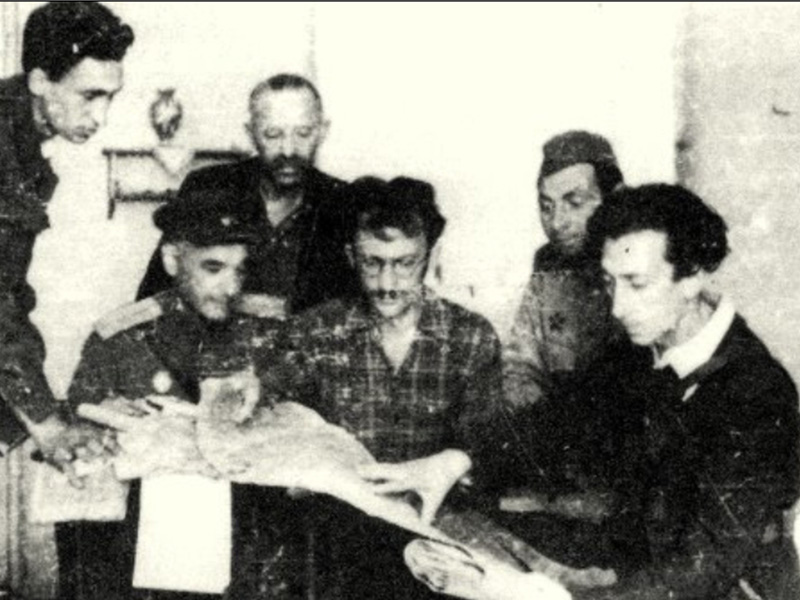It’s a little-known part of post-Holocaust history: After World War II, a small group of Jewish survivors, led by Abba Kovner, the poet and partisan leader, targeted Nazis for assassination. They took the ominous name Hanokmim, Hebrew for “the avengers,” and took justice into their own hands.
But was taking revenge against Nazis a form of justice?
That “very complicated” issue was addressed Nov. 1 by Rabbi Steven Jacobs, a professor of Judaic studies at the University of Alabama, in a pre-Holocaust Education Week lecture presented at Bialik Hebrew Day School.
The stage for the Jewish avengers may have been set, Rabbi Jacobs noted, following World War I, when survivors of the Armenian genocide formed Operation Nemesis to kill Turkish leaders who had been responsible for roughly 1.5 million Armenian deaths.
The best known action by the Nokmim was on April 14, 1946, when members sneaked into a bakery and painted diluted arsenic on some 3,000 loaves of bread for the 12,000 German prisoners of war at the Langwasser internment camp near Nuremberg. About 1,900 Germans got “seriously ill,” according to a report Rabbi Jacobs cited, and between 300 and 400 died.
Rabbi Jacobs quoted one of the avengers as saying this “was nothing compared with what we really wanted to do.”
He also cited the 1993 book An Eye for an Eye: The Untold Story of Jewish Revenge Against Germans in 1945 by John Sack, which detailed another episode: when the Communists took over Poland after the war, they recruited Jewish survivors of concentration camps and other institutions to run internment camps.
“It is estimated that between 60,000 and 80,000 Germans died during that period under the responsibility of Jews,” Rabbi Jacobs said, though he did not say how they died.
(Sack’s book was widely derided and discredited, with at least one prominent historian noting that the vast majority of those in charge of these camps were not Jews. The German publisher even cancelled the book.)
In any event, “I share this with you to remind you – to remind us – that history, our history, is not always what we wish it to be,” Rabbi Jacobs said.
“The stories we tell ourselves omit that which makes us truly uncomfortable and avoid forcing us to confront those questions we would rather not answer,” he added. “But I believe as a scholar that the way forward for us as Jews is to understand as completely as possible the past you are trying to uncover, warts and all, [and] recognize both our successes and the errors of our ways.”
But was this justice, at a time when the world refused to exercise it?
Jacobs noted that rabbis throughout the ages have argued that revenge is up to God. Yet the Torah, he added, teaches of a person called the goel hadam, or the blood avenger.
Jacobs noted that Jonathan Sacks, the former chief rabbi of the British Commonwealth, argued the words actually translate as blood redeemer, “one who restores equilibrium to the world and rights the wrongs.”
“Could we not argue then that the Armenians and Jews are blood redeemers of the world?” Rabbi Jacobs wondered. “Maybe. Maybe not.”
Further quoting Rabbi Sacks, Rabbi Jacobs said Jews are not free to take the law into their own hands, and that “passion may not override due process of law.”
Wrongs, he said, must be punished only after a fair trial and not just on behalf of victims, but all of society.
So how to reconcile Jewish law with the fact that Jews took the law into their own hands after the Holocaust?
“We do so first by accepting the reality that what was then, with all its agonizing complexity, was then, and this is now,” Rabbi Jacobs said. “Second, we refuse to cover over those aspects of our past which remain, at the very least, highly problematic, but equally force us to reject their solutions as our solutions, no matter what.”
Jews, he said, must adhere to the rule of law or risk returning to “the law of the jungle, where survival of the fittest is dependent upon both individual and group violence.”
The talk was presented by the Wierzbniker Society of Toronto, which marked, with candlelighting, the 73rd anniversary of the Nazi liquidation of the ghetto into which the Jews of the village of Wierzbnik had been herded and subsequently shipped to Treblinka
